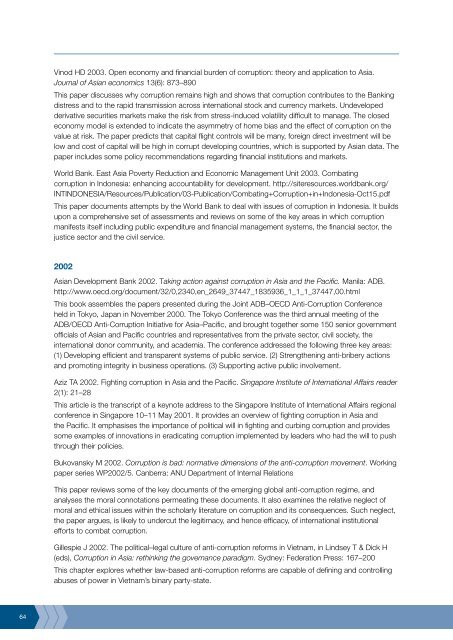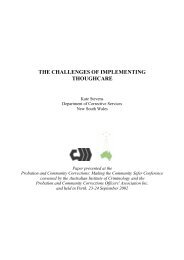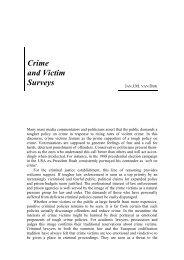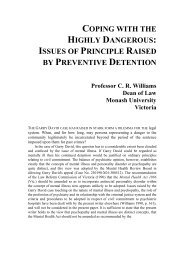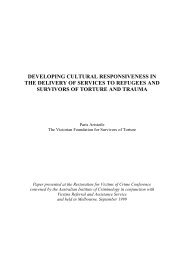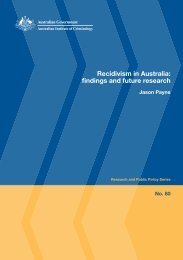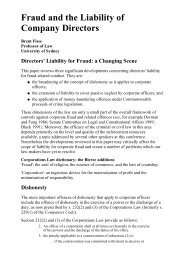Review of anti-corruption strategies Rob McCusker - Australian ...
Review of anti-corruption strategies Rob McCusker - Australian ...
Review of anti-corruption strategies Rob McCusker - Australian ...
Create successful ePaper yourself
Turn your PDF publications into a flip-book with our unique Google optimized e-Paper software.
Vinod HD 2003. Open economy and financial burden <strong>of</strong> <strong>corruption</strong>: theory and application to Asia.<br />
Journal <strong>of</strong> Asian economics 13(6): 873–890<br />
This paper discusses why <strong>corruption</strong> remains high and shows that <strong>corruption</strong> contributes to the Banking<br />
distress and to the rapid transmission across international stock and currency markets. Undeveloped<br />
derivative securities markets make the risk from stress-induced volatility difficult to manage. The closed<br />
economy model is extended to indicate the asymmetry <strong>of</strong> home bias and the effect <strong>of</strong> <strong>corruption</strong> on the<br />
value at risk. The paper predicts that capital flight controls will be many, foreign direct investment will be<br />
low and cost <strong>of</strong> capital will be high in corrupt developing countries, which is supported by Asian data. The<br />
paper includes some policy recommendations regarding financial institutions and markets.<br />
World Bank. East Asia Poverty Reduction and Economic Management Unit 2003. Combating<br />
<strong>corruption</strong> in Indonesia: enhancing accountability for development. http://siteresources.worldbank.org/<br />
INTINDONESIA/Resources/Publication/03-Publication/Combating+Corruption+in+Indonesia-Oct15.pdf<br />
This paper documents attempts by the World Bank to deal with issues <strong>of</strong> <strong>corruption</strong> in Indonesia. It builds<br />
upon a comprehensive set <strong>of</strong> assessments and reviews on some <strong>of</strong> the key areas in which <strong>corruption</strong><br />
manifests itself including public expenditure and financial management systems, the financial sector, the<br />
justice sector and the civil service.<br />
2002<br />
Asian Development Bank 2002. Taking action against <strong>corruption</strong> in Asia and the Pacific. Manila: ADB.<br />
http://www.oecd.org/document/32/0,2340,en_2649_37447_1835936_1_1_1_37447,00.html<br />
This book assembles the papers presented during the Joint ADB–OECD Anti-Corruption Conference<br />
held in Tokyo, Japan in November 2000. The Tokyo Conference was the third annual meeting <strong>of</strong> the<br />
ADB/OECD Anti-Corruption Initiative for Asia–Pacific, and brought together some 150 senior government<br />
<strong>of</strong>ficials <strong>of</strong> Asian and Pacific countries and representatives from the private sector, civil society, the<br />
international donor community, and academia. The conference addressed the following three key areas:<br />
(1) Developing efficient and transparent systems <strong>of</strong> public service. (2) Strengthening <strong>anti</strong>-bribery actions<br />
and promoting integrity in business operations. (3) Supporting active public involvement.<br />
Aziz TA 2002. Fighting <strong>corruption</strong> in Asia and the Pacific. Singapore Institute <strong>of</strong> International Affairs reader<br />
2(1): 21–28<br />
This article is the transcript <strong>of</strong> a keynote address to the Singapore Institute <strong>of</strong> International Affairs regional<br />
conference in Singapore 10–11 May 2001. It provides an overview <strong>of</strong> fighting <strong>corruption</strong> in Asia and<br />
the Pacific. It emphasises the importance <strong>of</strong> political will in fighting and curbing <strong>corruption</strong> and provides<br />
some examples <strong>of</strong> innovations in eradicating <strong>corruption</strong> implemented by leaders who had the will to push<br />
through their policies.<br />
Bukovansky M 2002. Corruption is bad: normative dimensions <strong>of</strong> the <strong>anti</strong>-<strong>corruption</strong> movement. Working<br />
paper series WP2002/5. Canberra: ANU Department <strong>of</strong> Internal Relations<br />
This paper reviews some <strong>of</strong> the key documents <strong>of</strong> the emerging global <strong>anti</strong>-<strong>corruption</strong> regime, and<br />
analyses the moral connotations permeating these documents. It also examines the relative neglect <strong>of</strong><br />
moral and ethical issues within the scholarly literature on <strong>corruption</strong> and its consequences. Such neglect,<br />
the paper argues, is likely to undercut the legitimacy, and hence efficacy, <strong>of</strong> international institutional<br />
efforts to combat <strong>corruption</strong>.<br />
Gillespie J 2002. The political–legal culture <strong>of</strong> <strong>anti</strong>-<strong>corruption</strong> reforms in Vietnam, in Lindsey T & Dick H<br />
(eds), Corruption in Asia: rethinking the governance paradigm. Sydney: Federation Press: 167–200<br />
This chapter explores whether law-based <strong>anti</strong>-<strong>corruption</strong> reforms are capable <strong>of</strong> defining and controlling<br />
abuses <strong>of</strong> power in Vietnam’s binary party-state.


